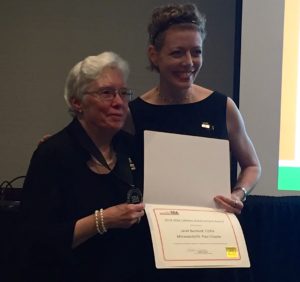Speaker Peter Nohle (Principal, Jackson Lewis, P.C.) gave us an awesome overview of the new exempt/non-exempt overtime rules. We had tons of questions, and he answered all of them. Chapter member Stacy Walker shares her top three “I didn’t know that!” moments from that business practice breakfast.
- PTO. If an exempt employee exceeds their annual PTO benefits, it is not permissible to deduct the excess hours/wages from the employee’s paycheck. Instead, it is proper to deduct the excess time from the following year’s benefit. Exempt employees are not allowed to “purchase” additional leave through a payroll deduction. An exempt employee may request a full (not partial) day off for personal reasons without using their PTO benefit, and in those cases it is allowable to deduct those wages from payroll.
- Travel Time Pay. Unlike most states, Washington State doesn’t have a “portal-to-portal” rule. There is flexibility for employers in how to handle this. The general rule in Washington is that the employee’s commute time from home to their first stop, and from their last stop to their home, is not compensated. However, all travel from point to point between the first stop and that last stop is to be considered “work” time and be included in compensation calculations. This is based on the practice of not considering an employee’s commute between home and office to be work time. The speaker cautioned that whatever policy a firm decides to employ, it is wise to work with employees who are affected to try and avoid creating situations where those employees are likely to become disgruntled. Should a disgruntled employee file a complaint, the firm’s entire employment practices can be under scrutiny even if the issue prompting the complaint is found to be without merit.
- Hourly Rate Calculations for Non-Exempt Employees. “Regular” hourly rates—not “base” hourly rates—must be used for overtime calculations, and need to include non-discretionary bonuses. Payments that must be included in calculating regular hourly rates include awards, bonuses, incentives, commissions, travel expenses, shift differentials, and lump sum on-call payments.
So, now you know.



 The guy who brought us “
The guy who brought us “ The subject of handling coworkers who just want to chat while you need to work came up at the EDSymposium16 session, “You Don’t Have to go Home From Work Exhausted: Work/Life Balance in Today’s World.”
The subject of handling coworkers who just want to chat while you need to work came up at the EDSymposium16 session, “You Don’t Have to go Home From Work Exhausted: Work/Life Balance in Today’s World.”  The Seattle chapter sends a hearty shout out to Janet Bucholdt, CDFA, on her Lifetime Achievement Award! Janet (at left in the photo) received the prestigious recognition at the Awards Banquet during EDSymposium16.
The Seattle chapter sends a hearty shout out to Janet Bucholdt, CDFA, on her Lifetime Achievement Award! Janet (at left in the photo) received the prestigious recognition at the Awards Banquet during EDSymposium16. #4: Watch out for concerted activity
#4: Watch out for concerted activity

You must be logged in to post a comment.